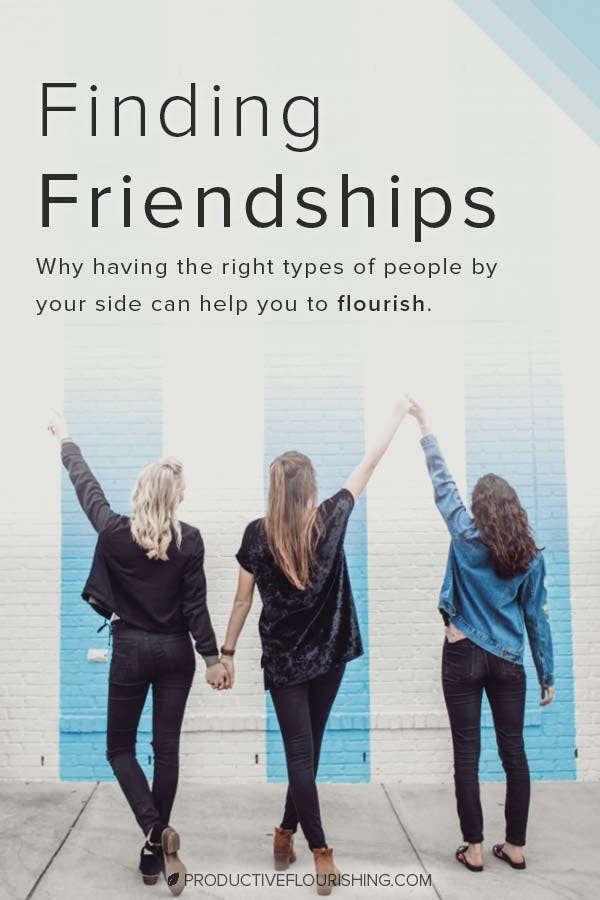How Friends Help You Flourish

Friends and flourishing are like cookies and milk: the addition of the one makes the other so much better. But friends and flourishing are unlike cookies and milk in that you can't have one without the other.
"Friends," Aristotle says, "are our second selves." They help define who we are and improve our character. They are the highest external good.
All friendships are not created equal, though. We have this somewhat strange phrase that we apply to those friends of the highest caliber: best friends. I say it's strange because it's not uncommon for us to identify multiple friends as best friends.
But why it makes complete sense is because we aren't really ranking friends like we do restaurants. What we are describing is the type of relationship we have with our best friends that's different than the type of relationship we have with the other people we interact with. Aristotle gave a useful way to understand the nature of friendships, and he categorized them into three types: PRODUCTIVE FLOURISHING
The Three Types of Friendship
1) Friendships of Utility: Those based on some good that one party is receiving from another. Most of these are likely to be found in your circle of business associates. The reason you all associate is because each of you provide some advantage for the other.
2) Friendships of Pleasure: Those based on some pleasure that one party is receiving from another. These are found where people find each others' company pleasant for one reason or the other. For instance, one person might be particularly funny, and you hang out with them because they're humorous. Were they to stop being humorous - well, there's no need for them to be around.
3) Friendships of Virtue: Those based on good people similar in virtue. The distinguishing feature of these types of friendships is that each friend finds the other intrinsically valuable and wishes for the success of the other for her own sake.
(It's probably easiest to understand friendship here in the broad sense, i.e. more like relationships with people. Thus, romantic relationships fall into this category as well.)
Not a whole lot of new ground here, when you think about it. Yet so few of us actually do think about the people we choose to develop friendships with. We've bought into the idea that friends become friends through sheer chance, and once befriended, we should remain friends.
Until we reflect upon why we became friends in the first place. Aristotle rightly dismisses the first two types of friendships due to how fleeting they are. Once a friend of utility no longer needs what you've been offering, he's gone. Done. Once a friend of pleasure no longer finds you pleasing, or, more commonly, finds something that pleases her more, she drops you. There's nothing more to these types of relationships.
Yet there's often that weird period where we try to keep the friendship going. We continue to offer goods to the other in the hope that he'll stay around. Or we continue to be pleasing to someone else so they'll continue to be friends with us.
They won't. The important thing to realize about these relationships are that they are one-sided precisely because one partner or the other is only in the relationship for their own interests.
True, complete friendship, however, is marked by not being a one way relationship precisely because the true friend cares for their friend for who they are, not what they provide. Whereas the lesser types of friendship commonly dissolve once one party stops providing what the other wants, true friendships sustain themselves indefinitely.
But there's something even more important to remember. True friends are good for each other in the sense that true friends make their friends better people. They do this in multiple ways:
First, by being the most virtuous people they can be. How do they do this, you ask? Through practice. The sheer fact that they're flourishing leads those around them to want to flourish and they're presence gives them an example. Genuine, inside-out flourishing is infectious.
Second, they actively try to help others around them flourish. Since they are generous, temperate, friendly, and virtuous in all the other ways, they help those around them as a matter of habit. These are the people who don't have to try to add value to those around them - their ability to do this is just who they have become.
Third, they bring out the best in you because they care for you as you are and as you want to be, not as they want you to be. They are the people you can open yourself up to so completely, in good times and bad. Rather than trying to figure out what good you can provide them, or how you can please them, you can just be yourself.
As I mentioned in an earlier post, people who belong in groups driven by virtue tend to have a synergistic effect on one another. Because the group is actively flourishing and trying to help the members of the group flourish, each member flourishes. Because each member of the group is flourishing, they try to help the group as a whole flourish. The members of the group will thus have an attitude of excellence (which necessarily includes helping others excel) and the group will have a culture of excellence (which will necessarily include helping members of the group excel). The combined effect of an attitude of personal excellence and the membership in a group with a culture of excellence is far more powerful than the sum of its parts.
It is thus not surprising at all that Aristotle spent such a long time talking about friendship in lectures he gave as a guide on flourishing.
A lingering worry: isn't it a bit selfish to evaluate your friendships by whether those friendships help you flourish?
Being wise is knowing how to cultivate those things in your life that add value and how to let go of those things that don't. Friendships of utility and pleasure are what they are and likely will never be any more. Understanding this, and changing your behavior based upon that understanding, enables you to more fully invest your time, energy, and spirit in those relationships that do add value rather than those that don't.
We know that with the added anxiety around COVID-19, it’s extra important to lean in to your support system, rather than acting like you’re strong enough on your own, or letting stress-induced arguments get in the way from genuine connection. Reaching out to old friends or long-distance family members may be just the thing you need to feel connected, and to help out others who also may be struggling. For more tips on staying sane during the COVID-19 pandemic, head over to our resources page.





